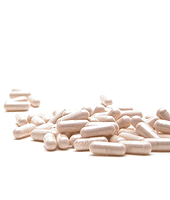Advertisement
Coenzyme Q10 and the Human Energy Crisis
The production of energy in the body’s trillions of cells is the greatest mystery of life. As living organisms, we combine oxygen from our lungs and glucose from our food in the mitochondria of our cells to produce adenosine triphosphate (ATP). ATP is the gasoline that fuels the numerous chemical reactions inside each cell and … Continued

The production of energy in the body’s trillions of cells is the greatest mystery of life. As living organisms, we combine oxygen from our lungs and glucose from our food in the mitochondria of our cells to produce adenosine triphosphate (ATP).
ATP is the gasoline that fuels the numerous chemical reactions inside each cell and provides the energy needed to drive cellular machinery. Our body requires many nutrients or cofactors to produce ATP in the mitochondria. Magnesium, cysteine, iron, niacin, manganese, thiamin, riboflavin, and carnitine are all involved in energy production. Another one of these cofactors is coenzyme Q10 (CoQ10).
Since CoQ10 is involved in energy production, you find the highest levels of it in tissue such as the heart muscle, which has massive energy production needs. Although CoQ10 is a compound naturally found in our body, there are many situations where supplemental dosing is required. Not only can it make you feel better, CoQ10 has been shown to reverse very serious disease and pathology.
Deficiency
Clinically, CoQ10 levels naturally decline with advancing age, so people over the age of seventy could benefit from supplementation. The greatest risk groups for CoQ10 deficiency are patients taking statin drugs (e.g., lovastatin and pravastatin), which deplete CoQ10 inside the heart muscle, making it less efficient. These drugs inhibit an enzyme required for the production of both cholesterol and CoQ10. Other drugs that do the same thing are beta blockers, phenothiazines, and tricyclic antidepressants.
Clinical Application
Cardiovascular disease CoQ10 is especially essential for the enhancement of heart muscle function in any form of cardiovascular disease. Since CoQ10 enhances energy production in the heart muscle cells, supplementation will improve contractility of the cardiac muscle, lower blood pressure, and improve heart muscle performance.
Specific cardiac problems that may benefit from CoQ10 supplementation:
- angina
- arrhythmia
- cardiomyopathy
- congestive heart failure
- cardiac surgery
- mitral valve prolapse
- hypertension
If you are trying to lower your blood pressure, allow four to 12 weeks to evaluate the benefits. You can take CoQ10, while you stay on your blood pressure medications without any worry of side effects.
Periodontal disease I have seen good results using CoQ10 to periodontal disease. One study reported that CoQ10 supplementation increases gum healing after periodontal surgery.
Immune function CoQ10 improves the strength of the immune system to battle viruses and bacteria. Patients whose immune systems weaken as they age, experiencing more colds and flus, will benefit from a daily supplement of CoQ10. AIDS patients have lower CoQ10 levels in their blood, and when supplemented with 200 milligrams per day, saw beneficial changes in their T-cell ratios.
Dosage
Most people start with a dosage of 30 mg per day, although some serious conditions such as breast cancer or congestive heart failure will require doses of up to 400 mg per day. It is very pricey so finding the right dose is critical. Side effects are minimal, but there are occasional reports of nausea, poor appetite, or skin eruptions.




